IRGC Commander Hails Palestinian Terror Groups
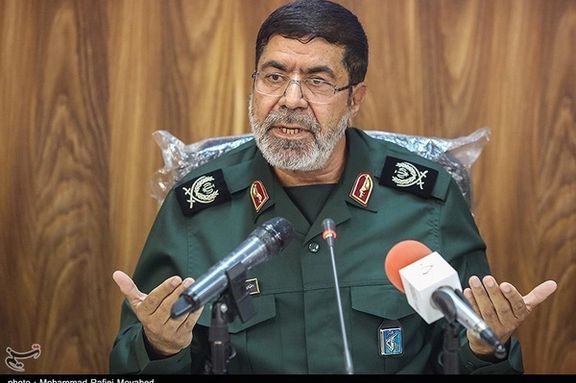
An Iranian IRGC Commander has hailed Palestinian terror groups, claiming 10,000 attacks have been perpetrated against Israelis this year.

An Iranian IRGC Commander has hailed Palestinian terror groups, claiming 10,000 attacks have been perpetrated against Israelis this year.
Brigadier General Ramazan Sharif, the head of the Intifada and Quds Central Headquarters of the Islamic Propaganda Coordination Council, said on Tuesday that the formation of a unified anti-Israeli front from South Lebanon and the Syrian Golan Heights to Gaza and the West Bank has challenged Israel more than ever. Groups backed by Iran have carried out terror across three of Israel's borders in the last week, in addition to violent unrest in Jerusalem.
"The emergence of young Palestinian resistance groups and the implementation of amazing operations in the West Bank shows the determination of the new generation of Palestine to reclaim their motherland," he said.
He claimed the constitutional crisis in Israel has challenged the hope of many Israelis for survival and alleged “two million residents of the occupied territories are emigrating from Israel, but the Zionists seek to hide this”. He failed to substantiate the wild figure which would be the equivalent of roughly 20% of Israel’s Jewish population, claiming the reverse migration is the impossibility of thinking of a bright future, in ironic echoes of the sentiments felt by the people of Iran.
He announced plans by the Islamic Republic for a 2,500 strong naval parade for civilians to commemorate Quds Day, an annual event held on the last Friday of the Islamic holy month of Ramadan to express support for Palestinians and oppose Israel and Zionism, a region-wide trend begun by the Supreme Leader.
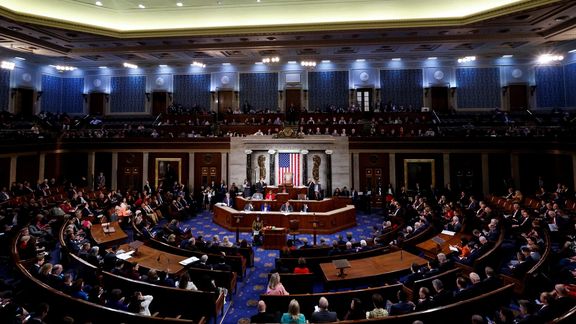
More than 130 Democratic and Republican Congresspeople issued a letter Monday asking the European Union to designate Iran’s IRGC as a terrorist organization.
Referring to the multiple threats the group has posed internationally, including the attempted murder of author Salman Rushdie in the US and a plot to murder ex-Trump aide John Bolton, the group claimed that Iran remains a “leading state sponsor of terror”.
Proscribed by the US in 2019 under the Trump administration, the IRGC has been operating for decades across the EU, most recently, including a plot to murder Iran International journalists in London.
A recent study by the Combating Terrorism Center at West Point showed that in the last five years Iran has instigated at least 33 plots to surveil, abduct, or assassinate citizens in Europe,” members of the US House of Representatives wrote in their letter.
Iranian communities in Europe and North America and several European and EU politicians and officials have been demanding that the EU and its member states should act to proscribe the Islamic Revolution Guard Corps (IRGC) in the aftermath of a deadly crackdown on protesters since September 2022.
Security forces under the command of the IRGC have killed well over 500 civilians during anti-regime protests, seriously injured hundreds of others and arrested more than 20,000. Among the detainees are hundreds of school children, women activists, journalists and artists.
The issue of adding the IRGC to the list of Europe’s terrorist entities became a rallying point for the Iranian diaspora, which launched online campaigns and held a large protest in Strasbourg on January 16 to lobby the European Parliament for passing the resolution.
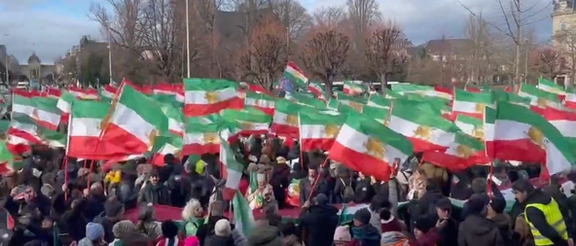
The European Parliament on January 19 overwhelmingly passed a resolution calling on the EU and its member states to designate the IRGC as a terrorist group, but its resolution is not binding for the bloc’s executive bodies.
While several key EU countries, such as Germany and France have been saying they are looking into the matter, the European Union foreign policy chief Josep Borrell has argued that such a step hinges on a legal determination by an EU member state court. However, critics believe the EU does not want to offend the Iranian regime, still hoping to open the way to a nuclear agreement with Tehran.
Congresswoman Kathy Manning (D-NC), Vice Ranking member of the House Foreign Affairs Committee, Chair of the Europe Subcommittee of the House Foreign Affairs Committee and Congressman Bill Keating (D-MA), Ranking Member of the Europe Subcommittee led the bipartisan letter.
The position of the Biden administration on the issue is not clear. There have been reports that Washington has asked the United Kingdom not to designate the IRGC, to keep channels open with Tehran with the hope of reaching a nuclear deal.
The EU and some member states have imposed several rounds of sanctions on Iranian entities and individuals also linked with the Revolutionary Guard in the past seven months, but designating the organization as a terrorist group has not happened.
“We strongly urge you, and your foreign affairs ministerial colleagues, to make the decision to fully sanction, penalize and delegitimize the IRGC, to help prevent them from further threatening democracy and freedom in the United States, Europe, and around the world,” the bipartisan group of lawmakers wrote to Borrell.
When the US designated the IRGC, Iranian negotiators part of the nuclear talks were demanding that the US should reverse its decision. The negotiations that the Biden administration began in April 2021 ended in a deadlock last September and since, the President has stuck by the designation.
In the wake of the collapse, the Islamic Republic has since supplied suicide drones to Russia that have been used against civilian targets in Ukraine, angering European countries and triggering several more rounds of sanctions.
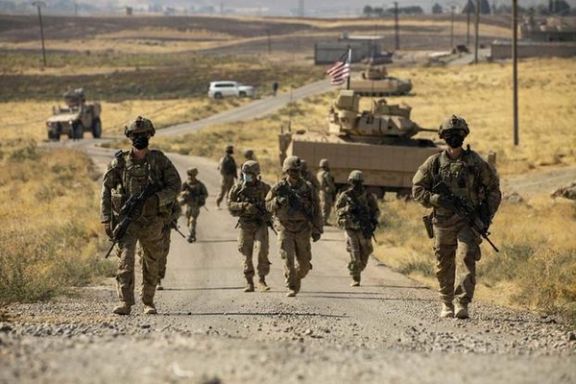
The US military says one of its bases in eastern Syria was targeted by a rocket attack on Monday.
In a statement, the military announced a rocket hit the Mission Support Site Conoco, the US oil company in eastern Syria, and another rocket was found at the attack point of origin, but they did not cause any casualties or damage.
No group has yet claimed responsibility for the attack. However, The Britain-based Syrian Observatory for Human Rights that monitors human rights in Syria suggested Iranian-backed militias may have been behind the attack.
The US forces targeted the positions of groups related to the Islamic Revolutionary Guard Corps in Syria with retaliatory airstrikes in late March.
The operation was a response to a suspected Iran-linked drone attack that killed a US contractor and wounded six other Americans in northeastern Syria.
Estimates show that currently, at least 900 US forces are present in Syria.
In late March, top US defense chiefs faced criticism from the Senate Armed Forces Committee claiming the response to Iranian attacks on US forces is weak and lacks deterrence.
Of 83 attacks in Iraq and Syria since President Joe Biden took office, just four retaliations have taken place.
The weak US approach to Iran has been a thorn in Biden’s side as the Democrats try to keep channels open with Tehran in the hope of reviving the nuclear deal, the JCPOA.
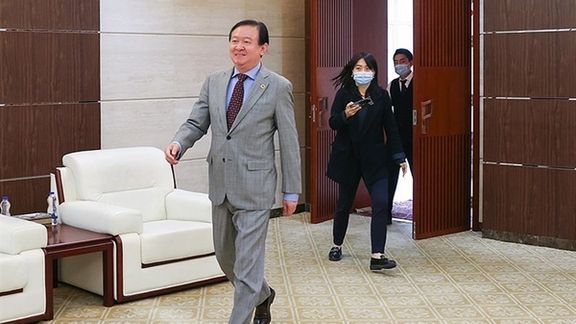
China's ambassador in Iran says Beijing’s mediation between Iran and Saudi Arabia stems from it desire to solve global security issues, not self interest.
In an exclusive interview published Monday by Tasnim news agency, affiliated with the Revolutionary Guards, Ambassador Chang Hua spoke about the reestablishment of relations between Iran and Saudi Arabia, the US troops in the region, and prospects of ditching the dollar in bilateral transactions among other things.
No Chinese media or Iranian media released a transcript of the interview, therefore Iran International cannot independently verify the readout published by the IRGC outlet.
Throughout the interview, Chang used every opportunity to gloat over Beijing’s role in the rapprochement between the arch-rivals, the Islamic Republic and the Al Saud and also reiterating that the US is in decline.
The long-term strategy for long-term peace and stability in the world is to take a new security path with dialogue instead of confrontation, and a win-win policy instead of a zero-sum strategy, the Chines diplomat said.

The talks between Iran and Saudi Arabia in Beijing have provided new examples and ideas for solving global security issues, he was quoted as saying, promising that China will continue to do its best to provide necessary support to Iran and Saudi Arabia and help promote security and stability in the Middle East.
The United States and Western countries make the best use of their hegemony of public opinion, and manipulate contentious issues through deceptive propaganda, he said, claiming that continuous interventions in the Middle East is their tactic to maintain their hegemony.
Chang said that “the Beijing agreement between Iran and Saudi Arabia” was welcomed by the international community but Washington accused China of “entering the Middle East for energy,” which show the evil intentions of the US. “Foreign interference is an important factor that weakens the security and stability of the Middle East... The US has committed serious human rights violations and many other crimes in the region, which has caused permanent and irreparable damage to the countries and people of the region,” Tasnim quoted Chang as saying.
He also urged the international community, especially influential countries outside the region, to respect the sovereignty of the countries of the Middle East and not to interfere in their internal affairs.
“As a good friend of the Middle East countries, China has no personal interest in the region, and has always been committed to the settlement of hot political issues,” he claimed, according to Tasnim.
Following the China-brokered deal to restore ties, the foreign ministers of Iran and Saudi Arabia met in Beijing for the first formal meeting in more than seven years on April 6. After years of hostility that fueled conflicts across the Middle East, Tehran and Riyadh agreed to end their diplomatic rift and re-open embassies in a major deal facilitated by China last month.
Critics in the US have blamed the Biden Administration for pushing Saudi Arabia toward China by pursuing the restoration of the 2015 nuclear deal with Tehran and losing the trust of Saudi leaders, as the great power in the region. The US believes China has a role to play in telling Iran to end its “destabilizing activities,” the State Department said as Iran’s president visited Beijing in mid-February.
However, as Iran moves closer to Russia and China, leading Iranian lawmakers and pundits have warned the government against over-reliance on Moscow and Beijing.
Earlier in the month, a moderate Iranian news website claimed that the Islamic Republic’s frozen assets in China are worth between $22 and $30 billion, suggesting that amid US sanctions even Tehran’s close ally is not willing to pay back its debts.
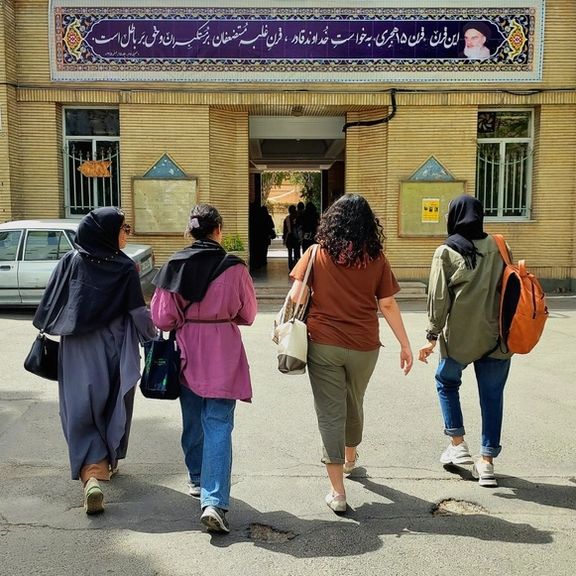
The Public and Revolutionary Prosecutor of a province in Iran says people should report their neighbors to the police if they see them not wearing hijab.
Ali Nesaei also said managers in both public and private sector are responsible for enforcing the hijab rules in the workplace. “If this happens in parks it is the municipality that is responsible. The same applies to universities,” he said at a press briefing while holding the police responsible for controlling the streets and businesses.
Nesaei added that civil servants will be referred to disciplinary committees even if they shed the hijab outside work and that in accordance with article 638 of the Islamic Penal Code they will initially have to pay a cash fine of over 10m rials ($20 or one fifth of minimum wage) for the first time they are charged with violating the hijab law. Vehicles could also be impounded from one to twenty days, if occupants are seen violating the dress code, he said.
Further infringements will entail more cash fines and deprivation from certain “privileges”, he said, referring to threats of seizing drivers’ licenses, passports, etc.
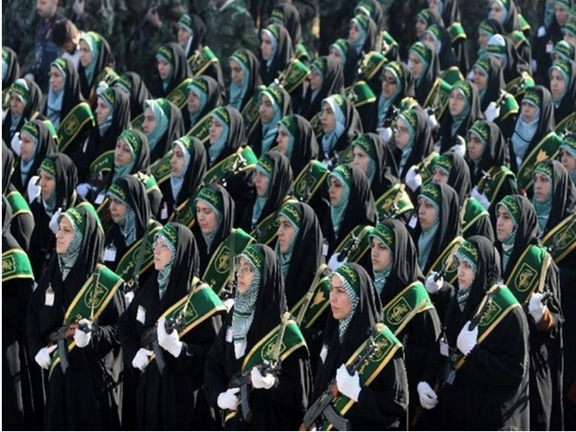
On Friday chief of Iran's law enforcement, Ahmadreza Radan, said that from April 15 police will use CCTV and facial recognition technology to document violation of hijab rules and provide the evidence to the judiciary for legal action against violators.
Radan said after only one warning, vehicles of those who remove their hijab in their vehicles will be “electronically impounded”, clamped on the street, or taken to a parking, while businesses, including restaurants, malls and catering halls will be shut down.
Hardliners keep insisting that most Iranians agree with hijab rules. “It’s good to [announce that] the hijabless will be photographed and that eventually they will be deprived of the privileges they have in the country…and punishments will be meted out to them. They cannot complain in the future because they have been warned,” said lawmaker Ahmad Karimi-Esfahani Monday while claiming that 90 percent of Iranian agree with hijab rules.
Encouraged by some clerics such as Ahmad Alamolhoda, Supreme Leader Ali Khamenei’s representative in Khorasan-e Razavi Province, vigilantes have been attacking hijabless women. Earlier this month, a video of a man pouring a tub of yogurt on the head of a woman in Mashhad went viral on social media and outraged many. Another video has emerged that shows a man, accompanied by several other men and women, beating a woman with his prayer beads.
A man beating a hijabless woman with his prayer beads, apparently after a quarrel over hijab.
“The whistle warning has been blown about the consequences of polarizing [the society over hijab] and pitching people against each other, but hardliners are still not listening,” reformist Shargh Daily said in a commentary Monday.
It appears that conservatives are also aware of the consequences but have been unable to prevent hardliner regime loyalists from going too far to avoid instances such as those seen in the videos of physical assaults that could be embarrassing and backfire against the regime.
In a commentary Saturday, the Basirat weekly of Khamenei’s political representative in the Revolutionary Guards (IRGC) admitted that too much emphasis on the issue could potentially cause people’s confrontation with the regime while accusing the opposition and its media of using hijab controversies to polarize the society and create unrest.
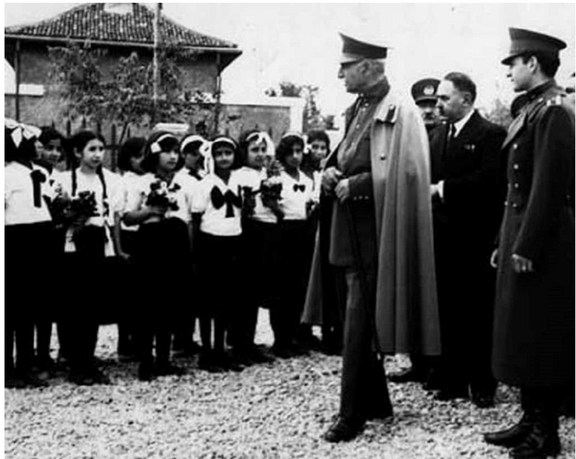
Hijab has been a very controversial issue in Iran for nearly ninety years. The founder of Iran's Pahlavi dynasty, Reza Shah, banned the hijab in January 1939 despite the strong opposition by clerics but a few years later under his son Mohammad Reza Shah Pahlavi the ban fell into oblivion.
Only five months after the Islamic Revolution of 1979, then leader of Iran Ayatollah Ruhollah Khomeini banned hijablessness in government offices. The ban gradually spread to the entire society within the next two years.
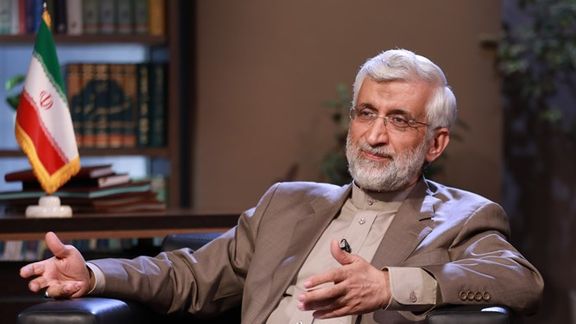
A website in Tehran says that former nuclear negotiator Saeed Jalili, and his brother who is programming chief at state TV plan to win control of the next parliament.
Khabar Online, wrote in an April 9 report that the Jalili brothers are determined to go from where they are in positions of power to the Iranian parliament (Majles) next year. Khabar Online added that all those who were in charge of the state television before were also political activists linked to major political groups.
The state television's current chief, Payman Jebelli appointed Vahid Jalili as his acting deputy during the first days after he got his mandate from Supreme Leader Ali Khamenei who supervises the organization and keeps an eye on the hiring and firing of key officials of the Islamic Republic of Iran Broadcasting (IRIB), which is the main tool for propagating his hardline ideas.
Saeed Jalili is a key figure in the ultra-conservative Paydari Party, which has a solid majority in the current parliament, but does not control the Speaker’s seat, which is occupied by Mohammad Bagher Ghalibaf (Qalibaf), a relative of Supreme Leader Ali Khamenei.
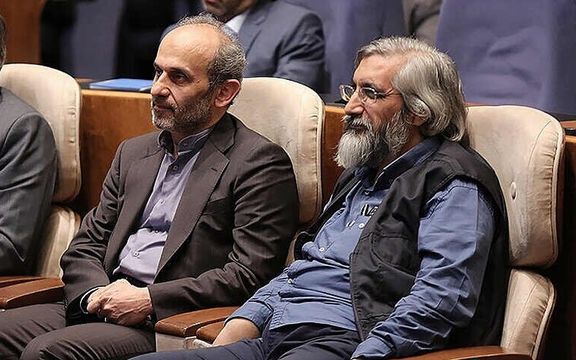
According to Khabar Online, it is not simply a matter of winning a majority in parliament, but Jalilis could be eying the Speaker's seat at the Majles, with the elder brother Saeed hoping to knock Ghalibaf out of the much-coveted seat.
Jalili, who had a dismal record as nuclear negotiator more than a decade ago, is squarely opposed to reviving the JCPOA nuclear deal with the West.
If they ever win the Majles, they would be determined to unseat nearly all of Iran's traditional conservatives from their positions of power and create some sort of monopoly for their likeminded ultraconservatives. In the process, it is clear that they would do their best to block any reformist or independent from getting elected.
Since several years before his appointment Vahid Jalili, better known as a vigilante group leader, tried to make his political views known by writing open letters to the heads of the IRIB and its political director Hossein Mohammadi, a confidant of Ayatollah Khamenei.
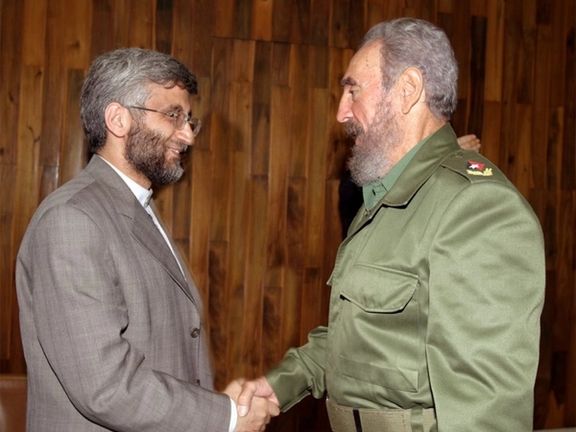
In those letters, the young Jalili often criticized the state media's behavior and suggested more hardline policies to govern media outlets, particularly TV channels.
Saeed Jalili, is thought to be steering the Raisi administration from the passenger seat, while avoiding the driver's seat and the responsibilities that comes with it, not only has planted his brother as the IRIB's acting deputy chief, his niece Alireza Khodabakhshi, is IRIB's point of person for everything relating to elections.
This gives Jalili a unique opportunity to determine who is to be groomed and promoted on the national TV and who is to be introduced to the nation as a black sheep through public opinion engineering and news manipulation.
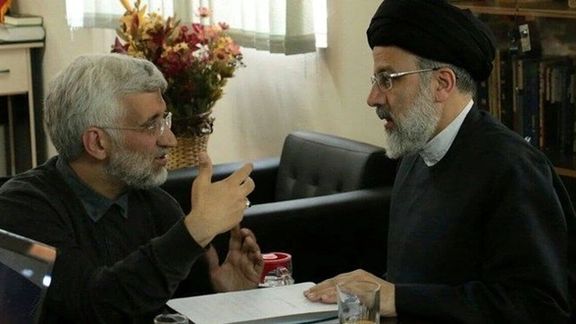
Thanks to Jalili's lack of expertise, the IRIB has lost a lot of its audience during the past two years as Jebelli has admitted in his recent interviews. However, this does not affect Jalilis and likeminded politicians' electability because the minority who watch IRIB's political preaching are the same minority that have taken part in extremely low-turnout elections in 2020 and 2021, which brought an inefficient parliament and notoriously incompetent President Ebrahim Raisi to power.
The majority of Iranians who are not represented among the hand-picked candidates are unlikely to take part in any election. Even the power-hungry reformists have said that they would not take part if their conditions, including due representation, are not met.
Saeed Jalili is rumored to be running his shadow government, which is now mainly based at the IRIB and is determined to use the platform to catapult himself, his brother, and their political allies to take full control of the parliament (Majles) next March.
Khabar Online, opined that the Jalilis' upper hand at the state TV violates the rights of other likely election candidates and further narrows the voters' choices. However, the nation has made its choice during the 2022 nationwide protests and that is: Going their own separate ways and defying the rules of the game as defined by Iran's hardliners.